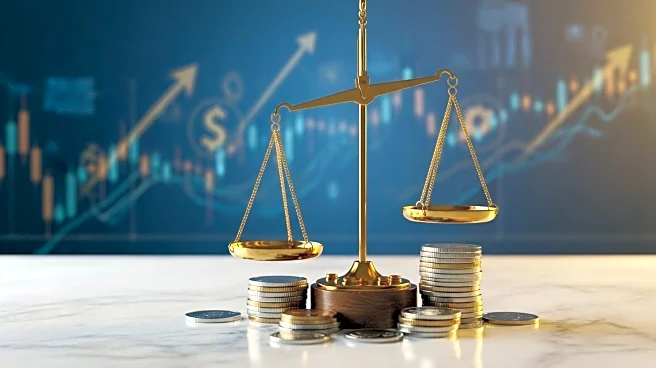What is the story about?
What's Happening?
The Federal Reserve has decided to lower interest rates by a quarter percentage point, a move that has drawn criticism from President Trump who had advocated for a more significant reduction. The decision reflects the Federal Reserve's cautious approach to monetary policy amidst ongoing economic uncertainties. President Trump has been vocal about his dissatisfaction with the Federal Reserve's actions, particularly targeting Fed Governor Lisa Cook, whom he seeks to remove from her position. The rate cut is part of the Federal Reserve's strategy to stimulate economic growth while balancing inflation concerns.
Why It's Important?
The Federal Reserve's decision to lower interest rates, albeit less than President Trump desired, has significant implications for the U.S. economy. Lower interest rates can lead to cheaper borrowing costs, potentially stimulating investment and consumer spending. However, the modest reduction may not satisfy those who believe more aggressive measures are necessary to counteract economic slowdown. President Trump's criticism highlights the ongoing tension between the executive branch and the independent central bank, raising questions about the influence of political pressure on monetary policy decisions. The outcome of this decision could affect market confidence and economic forecasts.
What's Next?
The Federal Reserve's decision may lead to further scrutiny and debate over its independence and the effectiveness of its monetary policy. President Trump's legal efforts to remove Fed Governor Lisa Cook could escalate, potentially impacting the governance of the central bank. Market analysts and economic stakeholders will closely monitor the Federal Reserve's future actions and statements for indications of its policy direction. Additionally, the response from financial markets and businesses will be critical in assessing the impact of the rate cut on economic activity.
Beyond the Headlines
The tension between President Trump and the Federal Reserve underscores broader issues regarding the independence of central banks and the role of political influence in economic policy. This situation may prompt discussions about the balance between government oversight and the autonomy of financial institutions. The implications of this dynamic could extend beyond immediate economic effects, influencing long-term policy frameworks and governance structures within the U.S. financial system.















